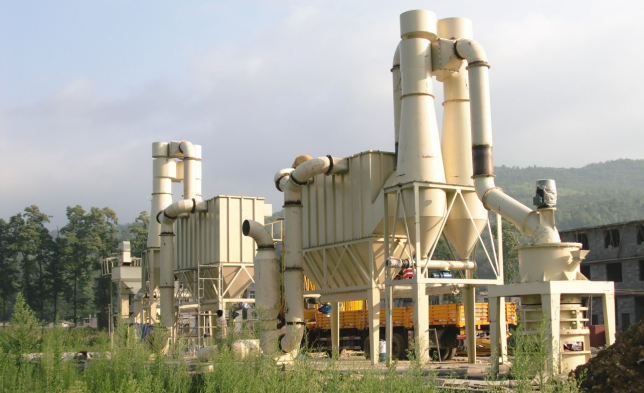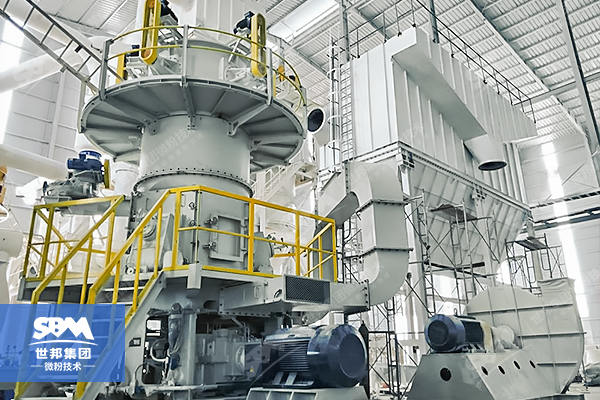Project Name: Gypsum powder production line in YunnanProcessing material: Gypsum
Finished product fineness: 130 mesh
Finished product output: 13-15 tons per hour
Finished product use: used in chemical industries such as grinding glass, rubber, pesticides, enamel, paint, phosphate fertilizer, papermaking, etc.
Equipment configuration: CLUM Ultrafine Vertical Mill/ HGM Micro Powder Grinding Mill/ Raymond Mill/ Powder Surface Coating Machine/ Hammer Crusher/ Bucket Elevator
PROJECT INTRODUCTION
The customer site is located in Yuxi City, Yunnan. After a number of company inspections, the customer finally chose our company to purchase a set of grinder production line for processing gypsum powder with 130 mesh ≥ D95, with an hourly output of 13-15 tons, and the equipment is running Stable, energy-saving and environmentally friendly, achieving dust-free operation, and becoming a local benchmark enterprise.
THE PROJECT SITE
Gypsum Powder Grinding Plant
HGM Gypsum Powder Grinding Mill
Gypsum powder production line in Yunnan
CLIENT FEEDBACK
From project design, site planning to installation training, SBM Shanghai Micropowder Technology has always provided free and considerate services, which is perfect!
--Customer: Mr. Dai
PROJECT BENEFITS

Energy saving and environmental protection, green grinding
The dust of the production line is collected by a negative pressure dust removal system and placed in a fully enclosed finished product warehouse, which realizes no dust spillage, a clean production environment, and discharge conforms to international standards.
High cost performance, considerable investment income
The fine calcium carbonate particles produced by this project have excellent shapes and better quality after being modified by the CLG powder surface modifier. They are well received in the market and have a high profit per ton.
Can run continuously for 24 hours
The reducer has circulating oil lubrication and circulating water cooling system to ensure the continuous operation of the ring roller mill for 24 hours.
Full process service, save time and worry
Shibang Industrial Shanghai's micropowder technology project design, equipment production, installation, commissioning, and after-sales service are integrated. The whole process service is convenient for users, and it has won time for the smooth commissioning of the project in a short time.
EQUIPMENT CONFIGURATION
Extended reading:
What is gypsum?
The main chemical component of gypsum is calcium sulfate (CaSO4) hydrate. Gypsum is a widely used industrial material and building material. It can be used as cement retarder, gypsum building products, model making, medical food additives, sulfuric acid production, paper filler, paint filler, etc. The microporous structure and heating dehydration of gypsum and its products make it have excellent sound insulation, heat insulation and fire resistance.
Main varieties of gypsum
1. Natural gypsum
Natural gypsum is the gypsum stone in nature. The main component of natural gypsum is calcium sulfate. It can be divided into dihydrate gypsum and anhydrous gypsum according to whether there is crystal water. It also contains some clay impurities and attached water. It is an important non-metallic mineral that has a wide range of uses and is non-toxic, harmless and beneficial to the human body.
It has been used in food, medicine, building materials and other fields since ancient times.
2. Industrial by-product gypsum (chemical gypsum)
Industrial by-product gypsum refers to the general name of by-products discharged from industrial production with calcium sulfate as the main component, also known as chemical gypsum or synthetic gypsum. It is the main raw material widely used in plastering gypsum at present, and it is used in plastering gypsum: desulfurized gypsum, phosphogypsum, and fluorogypsum.
Desulfurization gypsum
Desulfurization gypsum is a substance with calcium sulfate as the main component obtained by countercurrent mass transfer of flue gas and desulfurizer (limestone) slurry in the desulfurization reaction tower to form calcium sulfite, and then undergo a forced oxidation reaction.
Phosphogypsum
Phosphogypsum is an industrial by-product discharged in the process of wet process phosphoric acid production. About 4t~5t phosphogypsum is produced for every 1t of phosphoric acid produced. Its impurities are mainly phosphorus, fluoride, silicon dioxide, organic matter and other impurities, which affect the phosphogypsum water. Performance after chemical hardening. When using, we must pay attention to the harmless treatment of its impurities.
Fluorogypsum
Fluorogypsum is a by-product of the production of hydrofluoric acid. For every 1 ton of hydrofluoric acid, 3.6 tons of anhydrous fluorogypsum are produced. The produced fluorogypsum is type II anhydrous gypsum, and the calcium sulfate content is as high as 90%. After long-term storage, it will be converted into fluorogypsum dihydrate, and it should be dehydrated according to requirements when used.
3. Building plaster
Building gypsum is an air-hardening cementitious material made of natural dihydrate gypsum or industrial by-product dihydrate gypsum by heating and dehydrating at a certain temperature, which is mainly composed of β-calcium sulfate hemihydrate. Its characteristics are fast setting and hardening, good fluidity, small expansion rate, long fire protection time, and it is also the only material with respiratory function among the three major cementitious materials. Its biggest weakness is poor dynamic contactability, which can only be found on the inside of the building. use.
4. Anhydrous gypsum
Anhydrous gypsum is also called insoluble gypsum. It is obtained by calcination and dehydration of dihydrate gypsum and hemihydrate gypsum at 360 degrees to 1000 degrees, and is the final product that is stable at room temperature. The natural anhydrite that exists in nature also belongs to this category.
Since the hydration and hardening of anhydrous gypsum is very slow, it is difficult to exert its gelling performance. Therefore, when using it to prepare new building materials, it must be activated and stimulated to increase the hydration rate in order to achieve the desired material properties.
5. High-strength plaster
High-strength gypsum is a powdery cementitious material in which dihydrate gypsum is in a saturated water vapor medium or liquid aqueous solution, and is obtained under certain temperature, pressure or crystal conversion agent conditions. The main crystal form is calcium sulfate hemihydrate. The drying compressive strength is generally> 40MPa, and the advantages are high strength and small expansion coefficient. It can be used to produce light weight plastering gypsum, self-leveling gypsum and other products with a bulk density of less than 700kg/m3.
What are the uses of gypsum?
Gypsum generally refers to two minerals, raw gypsum and anhydrite. Raw gypsum can also be called dihydrate calcium sulfate, dihydrate gypsum, hydrated gypsum, and soft gypsum; anhydrite can be called anhydrous calcium sulfate. Gypsum gypsum is generally white and colorless; while anhydrite is generally white. The general application of natural gypsum is mainly concentrated in construction, art, ceramics, food additives, pharmaceuticals and medical gypsum boards.
1. Construction industry
The construction material industry is the main application field of gypsum, which is used in the production of various gypsum building material products as raw materials for cement and cementing materials. Such as the production of gypsum partition wall panels, load-bearing interior wall panels, external wall blocks, wall covering panels, ceilings, etc.
2. Model plaster
Generally used in casting, fine arts, ceramics and other industries, more popular.
3. Agricultural field
In agricultural production, gypsum powder has a high application value. It can be used to produce sulfuric acid and then produce ammonium sulfate fertilizer. Anhydrite can adjust the pH of the soil, improve the soil environment, and can also provide calcium for various fertilizers. , Sulfur and other nutrients.
4. Food industry
The superior performance of gypsum makes it a great contribution to the food industry. It can be used as a coagulant and as an animal feed additive.
5. Medical field
Gypsum has also played its superior performance in the pharmaceutical industry. It is also called fine stone and water cold stone in Chinese medicine. It is a heat-clearing and purging gunpowder, and it is mainly used to treat high fever, polydipsia, lung heat, cough and asthma, and stomach fire and toothache. Etc. In addition, plaster is also a medicine for clinical treatment of fractures and various orthopedic diseases.
6. Plastic and rubber fillers
After processing anhydrite, it can be used as fillers for plastics and rubber. Modified anhydrite fillers can improve the mechanical strength, heat resistance and dimensional stability of polymers.
7. Calcium sulfate whiskers can be produced
Gypsum can be transformed into calcium sulfate whiskers in an aqueous medium and under high temperature and high pressure conditions. It can be used as a reinforcing filler in resin-based composite materials, friction materials, adhesives and other industries.
What is the difference between gypsum and plaster?
Gypsum is a naturally occurring soft sulfate mineral, while plaster of Paris is a building material, we use it to protect or decorate the coating. Both of these materials contain calcium sulfate as the main ingredient.
Gypsum
Gypsum is raw gypsum ('mine' gypsum), a mineral (crystal) in nature, and it refers to CaSO4·2H2O. It is used as a raw material for cement, plaster of Paris, fertilizer, etc.
Plaster
1. Stucco, wall mud, plaster statue
2. ‘Medical’ plaster → sticking plaster, mustard plaster.
3. Plaster of Paris (calcined plaster), an artificial building material, its main ingredient is gypsum.





 India
India
 Vietnam
Vietnam
 China
China